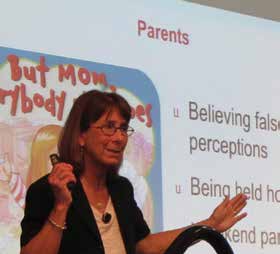PERCEPTION IS NOT REALITY – WHEN IT COMES TO LOCAL TEEN DRUG USE.
The majority of our kids are drug and alcohol free!
Perception is everything in the teen years. It’s a time when many young people want to fit in and often take chances based on their impression of what “everybody else” is doing. When it comes to drugs and alcohol, studies show that young people drastically overestimate use among their peers.
“You’ve never had a kid come to school on Monday, saying: ‘Great weekend! I was so raging sober,’ ” said Renee Soulis, a 30-year-veteran of FCD Educational Services and part of the Hazelden Betty Ford Foundation. Instead, young kids hear all about the ones who are drinking and this drives everything, Soulis explained to local school counselors and teachers during a recent workshop that was co-sponsored by Drug Free Collier and the Collier County Public Schools.
“The more use kids think that there is, the more use there will be. These false perceptions greatly increase risks. Students are making decisions based on incorrect data and this data gets reinforced multiple times a day,” Soulis said. “So much of our time and focus is spent on kids who are in trouble. We never talk about the healthy population,” she added, comparing it to today’s airline travel: “You’ll never see a headline that says, ‘Plane Landed Safely (although most planes do).’”
To correct these misperceptions, it’s important to use real data. The just released 2014 Florida Youth Substance Abuse Survey (FYSAS) gives us the real data we need and shows that most local teens are not using drugs or alcohol. As part of this survey, more than 1,200 students in grades 6 through 12 were polled from multiple schools throughout Collier County. The FYSAS is a collaborative effort between the Florida departments of Health, Education, Children and Families, Juvenile Justice and the Governor’s Office of Drug Control. It has been administered since 2002 and allows us to compare prevalence rates over the years. Although there are areas of concern, the 2014 data shows that overall substance use rates for Collier County youth are among the lowest they’ve ever been.
So, next time you hear someone saying that “everybody is doing it,” you might just want to show them the data that proves otherwise: (See Chart below.)
In order to keep our healthy kids healthy, it’s important to validate the positive choices that so many of our kids make each day and help them understand that they are actually in the majority and are not alone when they choose to stay drug and alcohol free. “It’s not that complicated and it starts in elementary school,” Soulis added.

DR. TIM PORTINGA SPEAKS TO LOCAL TEACHERS ABOUT HIS EXPERIENCES IN WORKING WITH ADOLESCENTS IN TREATMENT
Dr. Tim Portinga, Senior Clinician and Clinical Supervisor of Hazelden’s mental health clinic in Plymouth, MN also spoke to the group about his experiences in working with adolescents in treatment. As our culture condones use, the use tends to perpetuate.
“We build a house of cards and move into it,” he explained. This was of particular interest with attendees especially in light of growing efforts to legalize marijuana.
Lower perception of harm rates surrounding marijuana contribute to its overall use and directly impacts youth. Dr. Portinga explained how marijuana is “the great demotivator,” and said that one in eight teens that use marijuana will become addicted and for those who start in their early teens, one in six will develop cannabis dependency. Although most teens are not using marijuana, it’s important to clarify misperceptions.
“With such a positive reduction in overall drug use among local teens, we celebrate the collaborative work of our community in protecting our children from substance abuse,” said Melanie Black, Executive Director of Drug Free Collier. “We are thrilled that a majority of our teens are drug and alcohol free and recognize that there’s still more work to do,” she added. “It’s up to all of us to be part of the solution.”




Leave a Reply
Want to join the discussion?Feel free to contribute!